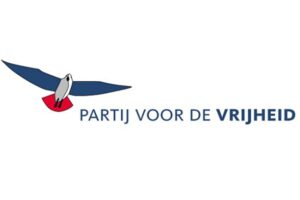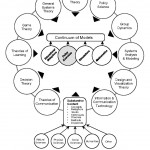PVV Blog 10 ~ The Ideology Of The PVV (Party for Freedom) In Practice
 With the arrival of the new Dutch cabinet under prime minister Schoof, we will witness the ideology of the PVV put into practice. How will the ideas of the PVV be realized in daily policy?
With the arrival of the new Dutch cabinet under prime minister Schoof, we will witness the ideology of the PVV put into practice. How will the ideas of the PVV be realized in daily policy?
We previously started this series under the name “The PVV in Power and Muslims” and in this ‘new’ series, the focus will again be on the Muslim community in the Netherlands and the effects of PVV policy on them. However, it doesn’t really matter what the series is called, as every decision and action by PVV powerholders always has negative effects on Muslims, migrants, and anyone who is not Dutch.
Today, the kickoff: about the government statement and the subsequent debate.
The ‘Rule of Law Paper’
The Debate
Political enthusiasts likely followed the debate that ensued after the government statement of the Schoof cabinet on Thursday, July 4, with cringing toes, raised eyebrows, clenched buttocks, pricked ears, and weary eyes. The opposition rose up against PVV ministers
Marjolein Faber and Reinette Klever due to their statements about “replacement” and the wearing of headscarves. The opposition parties were outraged, arguing that the two mentioned PVV ministers, with their statements, had already violated the unity of cabinet policy on day one. Prime Minister Schoof responded by asserting that his cabinet was there for all Dutch citizens, and, to emphasize his point, he looked at Labour – Green Left Party MP Lahlah, who wears a headscarf, and declared that he saw a person who is one of us.
On Paper, Everything is Correct
What is the issue here? Well, columnist Sita Sitalising articulated it strongly in the Dutch newspaper De Volkskrant on Saturday, July 6. Everyone is lulled into complacency by the fact that the entire team of ministers, including the PVV officials, as well as the leaders of PVV and its coalition partners VVD, NSC, and BBB, have signed a document declaring their adherence to the principles of the rule of law and democracy. This paper reality is something the prime minister never fails to emphasize: “My team is there for everyone, and we all adhere to democratic rules.” As everyone knows, paper is patient, but the law, also written on paper, exists precisely to indicate how to act when someone breaks the rules. The document signed by the cabinet and coalition parties is a kind of law: it comes into effect because we can assume that the rules will be broken. After all, if there are no violations, there is no need for a law. Read more
Neoliberalism Fueled Far Right Win In First Round Of France’s Snap Election

C.J. Polychroniou
07-04-2024 ~ The far right led in the first round of France’s parliamentary elections. The second round takes place July 7.
President Emmanuel Macron’s risky gamble to call a snap legislative election after his party suffered a humiliating defeat at the European Parliament elections on June 6-9 did not pay off. In fact, it backfired in a big way as voters, who turned out in record numbers, abandoned the center and cast their ballot for the far right and the left-wing parties that came together to form a new “Popular Front.” But arrogance, such as ripping up labor law and making it easier for companies to fire employees, has defined Macron’s long-term tenure in power (he won office in 2017 and was reelected in 2022) and his political legacy will be as the president who made the far right National Rally the dominant French political party, opening the path that would lead the fascists to power.
Marine Le Pen’s far right National Rally (RN) party came first in the first round of France’s parliamentary elections by securing 33.1 percent of the vote. The leftist New Popular Front (NPF) followed in second place with 27.99 percent, while Macron’s center-right Ensemble alliance came third with just 20.76 percent of the vote. RN did not cross the 289-seat mark for an absolute majority, but as Macron’s prime minister Gabriel Attal said, noting the obvious, the far right is now “at the gates of power” and the second round will indeed be decisive.
According to France’s complicated political system, if no candidate reaches 50 percent in the first round, the top two finishers automatically qualify for the second round, as well as those with over 12.5 percent. Thus, the second voting round, which takes place on July 7, will be a three-way contest, and this will work to the advantage of RN. But indicative of the fear that has spread across the rest of the political spectrum of the prospect of a far right government taking power in Paris, Gabriel Attal said that candidates from the Ensemble alliance that qualify for the second round but have no chance of winning will be withdrawn so as to give non RN candidates the best chance to win, and Jean-Luc Mélenchon, the veteran leftist who leads the NPF, will withdraw all its candidates who placed third in the first round. The strategy is to block RN from gaining any more votes. Even the European Trade Union Confederation chairperson called for a “blockade” of the far right. Read more
The Growing Weaponization Of Open-Source Information

John P. Ruehl – Independent Media institute
07-04-2024 ~ Open-source information and intelligence are fueling global participation in the war in Ukraine and other global hotspots, changing how the private sector, the public, and governments influence conflicts.
Within a day of the June 2, 2024, release of a video documenting the abuse of prisoners of war by a Russian soldier in Ukraine, open-source intelligence (OSINT) researchers had identified the Russian citizen and his involvement in Ukraine going back a decade. Ukrainian officials subsequently sent letters to the International Committee of the Red Cross and the United Nations to document the abuse for potential use in a future criminal trial.
This case is just one example of how OSINT is influencing the war in Ukraine. Online platforms have allowed citizens to broadcast updates to the world, democratizing information and intelligence dissemination. Powerful commercial satellites enable both sides to constantly detect troop and vehicle movements, while georeferencing allows internet users to pinpoint targets through photos and videos. Additionally, social media analysis can track public sentiment and propaganda efforts, providing crucial local and international insights into the psychological nature of the war.
Though the Russia-Ukraine war has shown the latest innovations in wartime OSINT, online platforms and global technologies have increased public involvement in conflicts for years recently. OSINT is being used to shape perceptions of wars, aid in military operations, provide insight into military performances, and expose wrongdoing. Driven by innovations from the private sector, the public, and governments, the growth of OSINT is expected to pose increasing risks to national security and personal privacy. Read more
Far-Right Surge Or Status Quo? Understanding The 2024 European Elections
 07-04-2024 ~ Last month’s European Parliament elections did not bring about the ultimate breakthrough of the far right as some had feared. They are gaining influence though, especially because the lines between them and forces in the political center are blurring. Consequently, we will have to look to the left to stop their surge.
07-04-2024 ~ Last month’s European Parliament elections did not bring about the ultimate breakthrough of the far right as some had feared. They are gaining influence though, especially because the lines between them and forces in the political center are blurring. Consequently, we will have to look to the left to stop their surge.
Between June 6 and 9, residents of the European Union (EU) went to the polls to elect a new European Parliament. There were fears in advance of a breakthrough by the far right, which was not surprising given the recent electoral successes of extreme nationalist, conservative, and elitist parties, often with xenophobic tendencies and fascist roots or inspiration.
Six of the 27 EU countries—Italy, Finland, Slovakia, Hungary, Croatia, and the Czech Republic—have far-right parties in government. Sweden’s minority government relies on the support of the nationalist Sweden Democrats, the second-largest force in Parliament.
In the Netherlands, the Partij voor de Vrijheid (PVV) of Geert Wilders won 37 seats in the 150-seat Parliament after a campaign filled with xenophobia and anti-Islam sentiment. His parliamentary group is much larger than those of the red/green alliance of European Commissioner Frans Timmermans and the liberals of former Prime Minister Mark Rutte, who won 24 and 25 seats respectively. At the time of the European elections, Wilders was busy forming the most right-wing government in his country’s recent history.
The Netherlands is a relatively small country, but the surge of the extreme right caused concern in the large countries of Europe as well. In Italy, Giorgia Meloni’s Fratelli d’Italia, a party that traces its roots back to the fascist movement of Benito Mussolini, has been in power since October 2022. In France, the Rassemblement National of Marine Le Pen topped the pre-election polls, while the AfD, Alternative für Deutschland, the extreme right force in Germany consistently scored better in opinion polls than any of the three governing parties. Read more
The Ultra-Right Is Governing Argentina. Who Is Javier Milei And What Is He Doing?

Lucía Converti – celag.org
07-04-2024 ~ On December 10, 2023, Javier Milei was elected president of Argentina with 55.6 percent of the vote. The eccentric president has attracted global attention for his outrageous media style, his extreme ideas like “blowing up” the Central Bank of Argentina, and a mixture of messianism and mysticism with religion and canine esotericism. Beyond the media show, Milei represents a radical shift in a country governed by progressivism during the last twenty years—Néstor Kirchner (2003-2007), Cristina Fernández de Kirchner (2007-2015), and Alberto Fernández (2019-2023)—except for the interval of Mauricio Macri (2015-2019), when it was clear that the institutions of the public (for health care, for education, and more) were considered to be inviolable.
Javier Milei’s public appearance began as a commentator on different television programs. He was one of the promoters of the protests against the mandatory isolation imposed during the pandemic, alleging the restriction of individual freedoms, and based on his popularity in social media, he was elected national deputy in the legislative elections of 2021 for his party “La Libertad Avanza” (Liberty Moves Forward). In 2023, with a strong erosion of the ruling party due to a dragging and poorly managed economic crisis, and an alliance with the conservative right “Juntos por el Cambio” (Together for change), he became President of the country.
Javier Milei defines himself as an anarcho-capitalist and a disciple of the Austrian economic school. What does this mean? Contrary to global practices of economic protectionism, Milei proposes unrestricted market freedom. He also proposes it not only as a foreign trade policy but also as a domestic policy.
Based on Murray Rothbard’s philosophy, Milei considers the state an illicit association that appropriates taxpayers’ money to sustain the privileges of the “political caste.” He believes in the market as the “natural” regulator of life in society and, therefore, public ownership and administration of services as an aberration. For instance, he believes public education and public health should not exist. This philosophy vindicates the “Law of Talion,” or an “eye for an eye,” as a valid practice of justice. Read more
Greece Just Became The First European Country To Impose A 6-Day Workweek

C.J. Polychroniou
07-02-204 ~ Years of brutal neoliberal capitalism combined with the left’s betrayal have led to widespread political demoralization.
Just when one thought that the neoliberal dystopia created in Greece since the eruption of its debt crisis could not get any darker, the current right-wing government of Prime Minister Kyriakos Mitsotakis has replaced the nation’s five-day workweek with a six-day workweek and flexible working hours. The controversial new law kicks into effect July 1, as Greeks have accepted it with little resistance.
The six-day workweek applies to both the public and the private sector. Specifically, the new labor law affects businesses, organizations and continuously operating enterprises that currently use the five-day workweek model and enables employers to compel their employees to work six days a week. The additional working day will be paid with an additional 40 percent of the daily wage.
As a poster child of neoliberal transformation, Greece is the first country in Europe to introduce the six-day workweek, and it comes at a time when other European countries have already adopted or tested, with overwhelmingly positive results, a four-day workweek system.
What is even more ironic about the new labor law is that Greeks already work the longest hours in Europe (while earning lower wages than at the beginning of the country’s financial crisis), while labor productivity, defined as real gross domestic product per hour worked, is approximately 61 percent of the European Union average and 55 percent of the eurozone average. In fact, according to the Organisation for Economic Co-operation and Development (OECD) Economic Outlook, labor productivity has actually fallen in recent years, revealing the moribund state of the existing economic model in Greece. Read more


